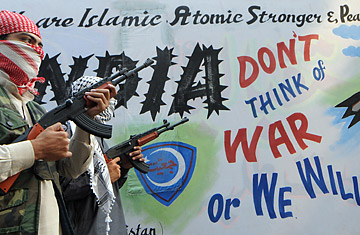
Pakistani activists pose in front of a banner that warns India against military action following the Mumbai attacks
Pakistan's official investigation into November's Mumbai terrorism attacks is scheduled for release later this week, and it is expected to rebut Indian accusations — echoed by Washington — that the massacre was planned on Pakistani soil. Leaked accounts in the Pakistani media suggest that the Federal Investigation Authority will report that, while at least one of the attackers is Pakistani, the attack was planned elsewhere. The same conclusion was announced last weekend by Pakistan's high commissioner to the U.K., Wajid Shamsul Hassan, which prompted outrage in India. Pakistan's Prime Minister, Yousuf Raza Gilani, duly went on Indian TV to clarify that Hassan "can't comment at the moment when the Prime Minister can't comment."
If New Delhi's initial accusation of Pakistani involvement, uttered within hours of the first shots being fired in Mumbai, was precipitous, so too was Islamabad's reflexive denial of any Pakistani involvement. Indian evidence — shared not only with Pakistan, but also with U.S. and British officials — includes a transcript of the interrogation of the surviving gunman, Ajmal Qasab, video footage captured from closed-circuit monitoring systems and details of phone conversations between the gunmen and their handlers. (See pictures of Pakistan's militant-plagued North-West Frontier Province.)
While Pakistan's President, Asif Ali Zardari, has vowed swift punishment for any Pakistanis proven to have been involved in the attacks, Pakistani government officials, academics and TV talk-show hosts routinely deny India's accusations. Shortly after the attack, high-level Pakistani officials acknowledged to foreign journalists that the Mumbai attackers had come from Pakistan, but when national security adviser Mahmud Durrani admitted on national television last month that Qasab was indeed Pakistani, he was promptly fired.
To be sure, the Indian accusations cannot be taken at face value. Blaming Pakistan skirts the unresolved status of Kashmir, which by all accounts appears to have been a key motivating factor behind the Mumbai attacks. And even if the attackers had come from outside, they would likely have needed help from locals with a murderous grievance against the status quo in India. The ritual of preemptive accusations and preemptive denials raises the stakes for both sides, making it difficult for either to back away from initial claims and undermining their prospects for collaboration against terrorism.
In some cases, Pakistani denial has reached ludicrous levels. Chaudhry Farooq, a Lahore high court advocate who claims to be Qasab's lawyer, tells TIME that the confession obtained by Indian investigators is a "fabrication." He maintains that Qasab was, in fact, abducted by Indian intelligence agents while traveling in Nepal more than a year ago. The Indians kept Qasab in custody all this time, he says, with the intention of framing him for a terrorist attack committed by Indians for the sole purpose of defaming Pakistan. When asked about the video footage of Qasab, Farooq insists that the attacker was actually a commando wearing a mask modeled on Qasab's face. "They are really good at doing that in Japan, you know," he says.
The fact that Farooq has three armed guards provided by the government posted at his door (to foil attacks by Indian intelligence, he explains) suggests that his far-fetched tale is granted remarkable credence in Islamabad. The widely accepted assumption of a global conspiracy against Pakistan does little to foster any serious inquiry into the very real problem of terrorism on Pakistani soil. And any move to admit the possibility of a Pakistani connection appears to be treated by some as a form of treason.
After it was revealed that Qasab hailed from Faridkot in Punjab, the media rushed to each of the three towns in the province that share the name. In one, reporters from a local newspaper found a man who claimed to be Qasab's father and residents who claimed to have known the gunman. But subsequent visits by journalists were greeted with animosity, fear and anger. The family purported to have been Qasab's had been whisked away, and a distant relative had moved into the house. A month later, when TIME visited, the defensiveness, if anything, had intensified. Said one resident: "If Ajmal Qasab came from here, we will be bombed by India." It's a convenient rumor to spread for a government seeking to deny something.
Pakistan's reluctance to confront its epidemic of jihadist militancy flies in the face of the spiraling violence on its own turf. In the past week alone, a U.S. national employed by the U.N. was kidnapped in Quetta. The Balochistan city is not typically a target for terrorism operations, perhaps because it is believed to be the headquarters of the Afghan Taliban — a fact so taken for granted that Taliban spokesmen in Afghanistan refer to "Quetta" in the way that a U.S. diplomat abroad might refer to Washington. On Tuesday, a carefully placed bomb near the Afghan border destroyed a bridge, severing a key supply route for NATO troops in Afghanistan.
Yet whenever things go wrong, the first instinct for many Pakistanis is to see a dastardly foreign hand at work. They imply that it's the Indians who are behind the militancy in the Swat Valley, a onetime honeymooner's paradise that has been turned into a charnel ground by an indigenous Taliban movement that beheads those accused of acting against Islam. Militancy in the border areas is blamed on the U.S. war in Afghanistan. In 2008 there were 63 suicide bombings in Pakistan, none of which are known to have been perpetrated by a foreigner. But as any graduate of a 12-step program can attest, the essential first step in tackling a problem is admitting that you have one. And that's a step Pakistan has yet to take.
